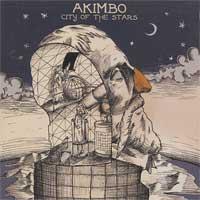I put off reviewing this record for a little while because I wasn't sure really how to go about doing it. Anyone who's read my archives knows that this is one of my favorite bands, and 2003's Elephantine rocked my face like none other (it still does). This CD came out this summer while the band was on tour, and they didn't get copies of it until the Chicago stop, which of course was the stop right after Minneapolis, where I saw them play. Ironically, I moved to Chicago right after that in lieu of a transfer between colleges. I ordered the CD from Seventh Rule and patiently awaited the day it would arrive in the mail. Sure enough, it arrived eventually, and I instantly threw it in my player and listened to it. And was amazed and blown away, and in some ways disappointed.
I guess, ultimately, you could compare the CD to my experience moving to Chicago. Compared to Minneapolis, Chicago is a lot larger; in comparison, City of the Stars is much larger than Elephantine. This is due to the addition of another guitar. Culturally, Chicago is a different than Minneapolis. Musicallly, City of the Stars is different from Elephantine. And so on and so forth. I could go on and on, but I'm sure you would just see the review as self-centered then. So I will simply proceed to the record itself.
With this release, Akimbo is as much Black Sabbath as they are Black Flag. The music is a tad slower, and showcases the double guitar action everywhere. From the opening chords of "Circle of Hair" to the fade out at the end of the eight-minute long "Uranaburg" (a song of epic proportions for a band who generally clocks in at two minutes) the CD seems to be more of a showcase of what the band is capable of doing with two dueling guitar parts. And although it's masterfully crafted, it just doesn't seem to rock as hard, which is a hump you have to get over. The band is expanding and experimenting with sound, evident in the blues-shuffle drum beat of "The Sorceress" or "High and Fighting" which features spacey riffs from all three guitars and a semi-march beat on the drums. Overall, Akimbo still brings their riff-based hardcore-punk sound blasting out of the speakers showing you that they know indeed where they started and aren't willing to give up all aspects of their sound, even though most songs on the new album clock in closer to four minutes.
Lyrically, the band references dark imagery and mythological references like they always have, with lines like "And so they spawn. Squirming like maggots from the anus of a God," or "On the day I face the lion's jaws, he'll drink this blood through broken teeth." But on this album there is also a lot of personal statements boldly thrown in as well. "Circle of Hair" ends with "Hey scene, nice hair. I should set your fucking head on fire. I'm gonna take your white stripes. I'm gonna paint them black." Or try "Aiming For the Heel," as it begins with "I've never considered myself a poet. This has never been about blowing your mind. Never. Not once. That being said, I'll leave you to your lazer warfare." But overall, the CD continues with a theme, and that theme being Tycho Brahe. For those of you unfamiliar (as I was when I picked up the CD, but a quick Google search provided sound research), Tycho Brahe was a Danish prince â born 1546, died 1601 â who was obsessed with astronomy. He used all the resources he could to map out the stars and create new instruments and technologies for doing so. The cover of the CD has a picture of Brahe's head with men inside using it as an observatory â note the gold nose Brahe has due to him losing the tip of it in a duel. The last song on the album, "Uranaburg," named for Brahe's own observatory, explores the notion of searching through the skies for an enormous feast of the stars, housed by Brahe himself. In a way, the song is lyrically a metaphor for the band expanding themselves physically and musically. The song closes with the line "We'll leave our dusty lives behind." On the album cover, placed on the inside of the hinge is the quote "May I not seemed to have lived in vain" by Brahe himself.
When it comes down to it, Akimbo shows so much growth through this record. They wrote a song four times as long as most songs in their catalog. They added another guitar player, and an entire new dynamic to their sound. They experiment with new tempos and structures. And they still bring the rock. Only, just not as much rock. They bring the rock with more melody. My only gripe is that this CD was recorded kind of hastily due to their new guitar player getting a kickass scholarship to a school in Chicago, and him having to leave the band to pursue a career being intelligent and full of wisdom. Don't worry, they have a new guitar player now, so they're still a four-piece. But the album, although very amazing in how raw the recording is, seems slightly hastily thrown together, with a few awkward transitions in the middle of some songs. All in all, another album of face-eaters has been constructed, and worthy of praise City of the Stars is.
